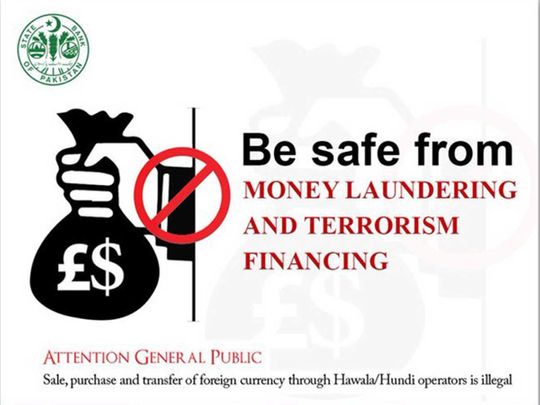
Dubai: A large number of overseas Pakistanis are still using illegal channels to send money back home, although the foreign remittances to Pakistan have recorded 15 per cent increase in December last year.
Pakistan has received a seven month high US$2.09 billion remittance in December compared to November 2019 and 20 per cent higher compared to December 2018, the State Bank of Pakistan (SBP) reported on Saturday.
Pakistan received a total of US$21.84 billion foreign remittance in the last fiscal year and is expected to receive more than 23 billion this year due to increase in number of Pakistanis going abroad for work.
Pakistan Prime Minister Imran Khan is expecting that the foreign remittance should surge to $40 billion in the coming years.
Tough target
However, this target seems to be very tough because large number of overseas Pakistanis are still using illegal channels to remit money to their country. “Many people still use illegal channels to remit money as they do not want to anwer uncessary queries by Pakistani authorities concerned about their source of income,” a banker told Gulf News on the condition of anonymity. He said that many Pakistani expatriate especially those who sent handsome amount to Pakistan, had to undergo harsh questioning by officials from the FBR (Federal Board of Revenue) about the source of their income. Pakistani expatriates are unable to understand why they have to present the proof of their income to Pakistan while sending money back home.
FATF recommendations
The Pakistan’s central bank chief had recently told the federal cabinet that overseas Pakistanis were reluctant to provide additional information about themselves to banks fearing that their data, which would be shared with the Federal Bureau of Revenue (FBR) in line with the Financial Action Task Force’s {FATF) recommendations, could be ‘misused’.
Dr Reza Baqir, the State Bank of Pakistan governor on Friday said overseas Pakistanis were increasingly using informal channels to send remittances to the country.
“We are seeing that the use of formal channels for sending money (by expatriates) is not growing as much as the use of informal channels,” Baqir said while addressing the fourth annual banking award, reported The Express Tribune.
Higher cost of money transfer
“The reasons for this may be the comparatively higher cost of sending money (through formal channels) and the questions asked (by banks) from the senders,” he added.
Bankers and experts have estimated that receipt of remittances through illegal channels stood at around $8 billion a year. Pakistan received $9.3 billion in the first five months (July-November) of the current fiscal year through legal channels.
Crackdown on illegal channel operators
Last year, the government had launched a crackdown on the operators of the illegal channels including: ‘hundi’ or ‘hawala’ money transfer systems and ran a campaign to encourage the use of legal channels like banks.
The country’s foreign reserves have improved to $11.5 billion from a low of $7 billion a few months ago.
A banker, who heads the remittances department at a large bank, pointed out that a significant increase in Pakistanis taking up jobs in different companies abroad may have played a big role in boosting remittances to Pakistan.
On average, over 1,700 Pakistanis found jobs in foreign countries every day in the year ended December 31, 2019 compared to over 1,000 people per day in 2018, according to a statement issued by the Bureau of Emigration and Overseas Employment.
More Pakistanis finding jobs abroad
Some 625,203 Pakistanis went aboard in 2019 compared to a total of 382,439 in 2018, the BE & OE reported on its official website. The total number of Pakistanis working across the country’s borders increased around 6% in 2019 to 11.11 million.
“The diplomatic efforts coupled with oil price stability created more employment opportunities for Pakistani workforce mainly in Saudi Arabia and the UAE — the largest destinations for Pakistani expatriate workers,” report said.
The notable growth in remittances in December 2019 helped improve the overall remittances by 3% to $11.39 billion in first half (Jul-Dec) of current fiscal year 2019-2020 compared to $11.03 billion in the same period of previous fiscal year, the SBP said.
“The increase in December remittances is seasonal,” remarked Taurus Securities Deputy Head of Research Mustafa Mustansir.
He elaborated that more Pakistani workers abroad sent home higher amounts during winter holidays, which fall in December every year.
Remittances from major countries
In December 2019, the inflow of workers’ remittances from Saudi Arabia amounted to $472.94 million compared with the inflow of $414.59 million in December 2018.
Workers from the UAE sent home $427.56 million in December compared to $351.19 million in the same month of last year.
They sent $357.45 million from the US compared to $276.29 million last year whereas from the UK remittances stood at $324.57 million compared to $267.79 million.
Pakistanis remitted $205.73 million from GCC countries (including Bahrain, Kuwait, Qatar and Oman) compared to $174.42 million in December 2018.
They sent $56.42 million from EU countries compared to $47.48 million. Remittances received from Malaysia, Norway, Switzerland, Australia, Canada, Japan and other countries during December 2019 amounted to $252.56 million against $216.35 million in December 2018, the central bank reported.








